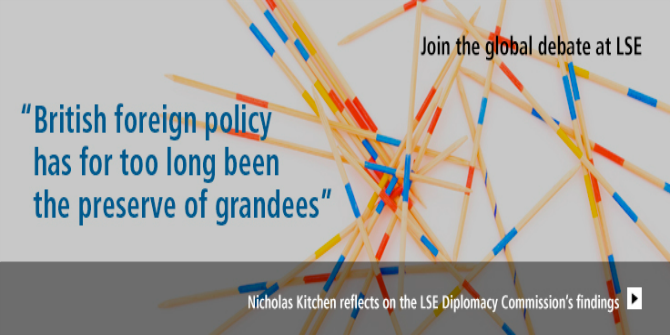 David Howarth explains the legislation and parliamentary rules that determine who is recognised as the official Leader of the Opposition in Parliament. The political implications of these procedures are significant, given current discussions about who would form a government if the current one were to lose a vote of no confidence.
David Howarth explains the legislation and parliamentary rules that determine who is recognised as the official Leader of the Opposition in Parliament. The political implications of these procedures are significant, given current discussions about who would form a government if the current one were to lose a vote of no confidence.
Jeremy Corbyn has explained his position on what happens if the Johnson government falls:
I am the leader of the opposition, the leader of the Labour party. All the constitutional precedents are, when a government collapses, it’s the leader of the opposition that takes over.
As several commentators have pointed out, Corbyn’s second sentence is inaccurate. True enough, when UK governments collapse, sometimes leaders of the opposition do take over. That happened, for example, in 1905, in 1924 and in 1974. But on other occasions, in 1916, 1922 and 1931 for example, the leader of the opposition did not take over. In 1916, a member of the same party became Prime Minister. In 1922, the new Prime Minister came from the other party in the previous coalition. And in 1931, the same Prime Minister started again supported by a differently constituted majority.
Corbyn is simply wrong. No such constitutional rule exists. If there is a rule at all (which one might doubt), it is that the person best placed to provide a stable administration takes over, even if, as in 1905, that administration was not likely to be able to govern for long.
But perhaps more interesting is Corbyn’s first sentence. Undoubtedly Jeremy Corbyn is the current leader of the opposition and he is the current leader of the Labour Party, but, contrary to Corbyn’s implication, the two things are not the same. Corbyn enjoys important privileges in Parliament, not least the benefit of the convention, enjoyed by no other MP, that the government exercises its discretion to control the time of the House in favour of allowing a debate and a vote on a motion of no confidence that stands in his name. But that privilege attaches to his position as leader of the opposition. It does not attach to his position as leader of the Labour Party.
Corbyn is leader of the Labour Party by virtue of the Labour Party’s own rules, which govern, for example, how he might be challenged, and how those rules themselves might be changed. But he is obviously not leader of the opposition by virtue of the rules of the Labour Party. Political parties, contrary to what they sometimes think, control, at least as far as the law allows, only their own internal workings. They are not organs of the state.
But that raises an important question: by virtue of whose decision is Corbyn leader of the opposition? The answer to that question might surprise some, though it is entirely rational. Corbyn is leader of the opposition ultimately because he is recognised as such by the Speaker of the House of Commons. Two lines of reasoning lead to that result: one legal and one parliamentary.
The law
The first reason for saying that ultimately the Speaker decides who is the leader of the opposition is that the law says so. The Ministerial and Other Salaries Act 1975 authorises the payment of an official salary to the leader of the opposition. Section 2 of that Act says that the leader of the opposition is the member of parliament who is ‘the Leader … of the party in opposition to Her Majesty’s Government having the greatest numerical strength in the House of Commons.’ But it then adds, in section 2(2):
If any doubt arises as to which is or was at any material time the party in opposition to Her Majesty’s Government having the greatest numerical strength in the House of Commons, or as to who is or was at any material time the leader in that House of such a party, the question shall be decided for the purposes of this Act by the Speaker of the House of Commons, and his decision, certified in writing under his hand, shall be final and conclusive.
That looks like the end of the matter. The Speaker decides. But not quite. Section 2(2) is restricted to ‘the purposes of this Act’, which means for the purposes of paying the leader of the opposition’s salary and the designation of the person who receives the official salary attached to being opposition chief whip. But who decides for other purposes, especially for the purposes of the motion of no confidence convention?
Government and Parliament
The current Speaker, John Bercow, has asserted that in his view the Speaker decides not only for legal purposes but also for parliamentary purposes. In 2016, in response to an opportunistic point of order claiming that Corbyn, having lost the support of the overwhelming majority of Labour’s MPs, could not possibly be considered the leader of his party, Bercow said:
I can confirm that the Labour party currently constitutes the official Opposition and that its leader is recognised by me, for statutory and parliamentary purposes, as the Leader of the Opposition. He will have noticed that I called the Leader of the Opposition earlier to ask a series of questions of the Prime Minister. He will also be aware that today we have Opposition business duly chosen by the Leader of the Opposition, as indicated on the Order Paper. I should perhaps add that in making these judgments and pronouncing in response to points of order, I do give, and have given, thought to the matter, and I have also benefited from expert advice. These matters are not broached lightly.
The basis of Bercow’s answer, which is now entrenched in Erskine May, the bible of parliamentary procedure, is that the position of leader of the opposition is a parliamentary job. It is mentioned in the Commons’ standing orders and recognised in the daily practices of the House. As such, the only options for deciding who holds the position are the House itself and the Speaker. The problem with saying that the House decides, that MPs might vote on who counts as the leader of the opposition, is that it leads to an absurdity. A government-supporting majority would be able to designate one of their own as leader of the opposition. And so, the decision must be for the Speaker.
The government might counter that the motion of confidence convention is an exception. It might argue that the convention forms part of the rules that give the government discretion to determine what the House debates, so that for the purpose of those rules the government itself should also determine who counts as leader of the opposition. But that view also leads to an absurdity. If the government could designate the leader of the opposition for the purpose of the convention, it could, for example, designate one of its own backbenchers or even a minister, as leader of the opposition, and thus never have to face a motion of no confidence. That cannot possibly be right. The Commons might have delegated its power to control the time of the House to the government for many purposes, but those purposes cannot possibly include making the government immune from motions of no confidence.
Another possibility is that the government might refuse to comply with the convention, declining to allow the leader of the opposition designated by the Speaker to move a motion of no confidence. That would raise interesting and important questions as to how the Speaker might nevertheless enforce the convention. He might, for example, accept a privilege motion, exempt from the government’s control of the order paper, perhaps on the basis that the government, in defying a clear convention and a ruling of the chair as to who is leader of the opposition, would be treating the House with contempt. Alternatively, he might accept the no confidence motion, or a motion paving the way for it, anyway, using Standing Order 24.
A new opposition leader?
The conclusion that the Speaker decides who is leader of the opposition has potentially important current political consequences. If large numbers of Labour MPs, under the leadership perhaps of Tom Watson, were to declare themselves to be a separate parliamentary party, in numbers greater than those staying loyal to Corbyn, it would ultimately be for Bercow to decide whether Corbyn or Watson was the person entitled to have his motions of no confidence debated and voted on. The internal rules of the Labour Party would be irrelevant.
___________
Note: the above was first published on Democratic Audit. Featured image credit: UK Parliament/(CC BY-NC 2.0) licence.

David Howarth is Professor of Law and Public Policy, University of Cambridge.








Thanks for the interesting article. One historical situation I would like to know more about is that in the Second World War, where, according to my brief Wikipedia researches, the Labour Party managed to be in government while also nominating the Leader of the Opposition. If the LoP had simply been the leader of the largest parliamentary party not in government it would have been James Maxton, leader of the tiny pacifist Independent Labour Party. Was this effectively the speaker’s decision back then, or were other forces at work?